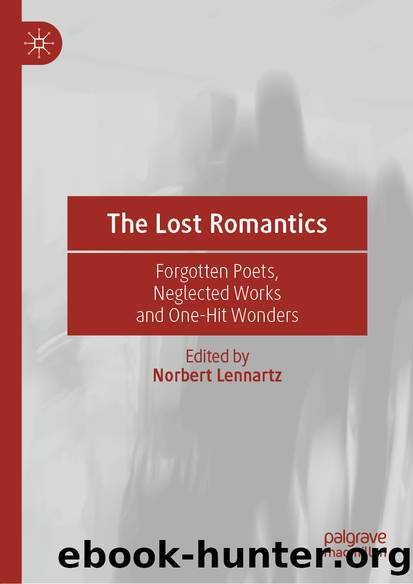The Lost Romantics by Unknown

Author:Unknown
Language: eng
Format: epub
ISBN: 9783030355463
Publisher: Springer International Publishing
âI loveâ, the words Clare had earlier so often called upon as the way into a sonnet, make delayed entry to reiterate his affection for the maple, the leafy âclothingâ it sustains, and for the times and places it is encountered. In both the Spenserian stanza and the sonnet, Clare displays a formal intelligence and suppleness invigorated by contact with experience. The form is freshened by feeling. But any potential challenge to the artifice and verbalism of Victorian poetry is dimmed by the absence of any cumulative agenda uniting the artistic discoveries; one longs for evidence of Clareâs sense of poetic mission beyond the individual poem. His endeavours are isolated from the debates and poetic climate of the age.
The visual power of the ending of âThe Maple Tree â depends upon the transfigurative force of Clareâs verb âgemmâdâ. The late poems often give the sense that Clare takes figurative language literally: the yellowhammer that flies in with âhead of solid goldâ at the end of the sonnet on that bird (Later Poems, âThe Yellowhammerâ, l. 14) is another deftly arresting instance. The impression is of a poet seeing nature as though it had the permanence of art. Robinson and Summerfield put it boldly: âthere is a resemblance to Van Gogh, and the same assurance in an idiom peculiar to himselfâ.14 Often a visionary extravagance flashes within unremarkable structures, as in âAutumnâ (Later Poems, âThe thistle downâs flyingâ), whose comparisons swing from the oddly domesticââThe ground parched and cracked is Like over baked breadâ (l. 5)âto the unsettlingly otherworldly: âBurning hot is the ground Liquid gold is the air / Who ever looks round Sees Eternity thereâ (ll. 11â12). But Clare is at his most responsive to a state of mind in which glimpses of âEternityâ open out of the everyday when he finds a form that enables him to contemplate, rather than simply convey, this intensity. The prose poem beginning âThe drew drops on every blade of grassâ attunes its rhythms to rippling counterflows of loss and wonder as visionary and more mundane apprehensions of nature overlap; the formal imagination at work again shows Clareâs sympathy with burgeoning nineteenth-century modes. âThe dew drops on every blade of grass are so much like silver drops that I am obliged to stoop down as I walk to see if they are pearlsâ,15 Clare begins, his idiom accommodating a super-tuned particularity of vision (who can see âevery blade of grassâ?) and an instinct for how language guides our apprehension: to say that the âdew dropsâ are like âsilver dropsâ shapes as though to apply a simile, but in fact just reinforces the physical characteristics of the drops; a combination of intensification and disappointment is underpinned by the repetition (the âdropsâ are like⦠âdropsâ) and the image hovers halfway between the literal and the figurative before the more explicit comparison with âpearlsâ. Throughout the passage, Clareâs repetitions answer a recurrent and flawed effort to make the transient permanent: The drops are âso like gold
Download
This site does not store any files on its server. We only index and link to content provided by other sites. Please contact the content providers to delete copyright contents if any and email us, we'll remove relevant links or contents immediately.
Kathy Andrews Collection by Kathy Andrews(10616)
The remains of the day by Kazuo Ishiguro(7623)
Spare by Prince Harry The Duke of Sussex(4259)
Paper Towns by Green John(4209)
The Body: A Guide for Occupants by Bill Bryson(3883)
Be in a Treehouse by Pete Nelson(3260)
Harry Potter and the Goblet Of Fire by J.K. Rowling(3153)
Goodbye Paradise(3019)
Never by Ken Follett(2959)
Into Thin Air by Jon Krakauer(2741)
The Remains of the Day by Kazuo Ishiguro(2648)
The Genius of Japanese Carpentry by Azby Brown(2644)
The Cellar by Natasha Preston(2634)
Drawing Shortcuts: Developing Quick Drawing Skills Using Today's Technology by Leggitt Jim(2554)
120 Days of Sodom by Marquis de Sade(2471)
Architecture 101 by Nicole Bridge(2375)
Machine Learning at Scale with H2O by Gregory Keys | David Whiting(2373)
The Man Who Died Twice by Richard Osman(2352)
Industrial Automation from Scratch: A hands-on guide to using sensors, actuators, PLCs, HMIs, and SCADA to automate industrial processes by Olushola Akande(2336)
